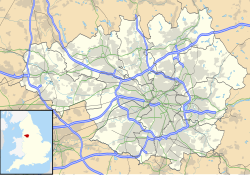St Michael and All Angels Church, Mottram
| St Michael and All Angels' Church, Mottram | |
|---|---|
 St Michael and All Angels' Church, Mottram, from the south | |
| 53°27′16″N 2°00′36″W / 53.4544°N 2.0101°W | |
| OS grid reference | SJ 997 953 |
| Location | Mottram in Longdendale, Greater Manchester |
| Country | England |
| Denomination | Anglican |
| Website | The Parish of Mottram-in-Longdendale |
| History | |
| Status | Church |
| Dedication | St Michael |
| Architecture | |
| Functional status | Active |
| Heritage designation | Grade II* |
| Designated | 1 November 1966 |
| Architectural type | Church |
| Style | Perpendicular |
| Completed | 1855 |
| Specifications | |
| Materials | Stone, slate roof |
| Administration | |
| Province | York |
| Diocese | Chester |
| Archdeaconry | Macclesfield |
| Deanery | Mottram |
| Parish | Mottram in Longdendale |
| Clergy | |
| Vicar(s) | Rev Cait Walker |
| Laity | |
| Reader(s) | Allen Standeven |
| Churchwarden(s) | Dejan Melovic & Chris Kneen |
| Parish administrator | Juliet Edwards |
St Michael and All Angels Church stands on Warhill overlooking the village of Mottram in Longdendale, Greater Manchester, England. The church is recorded in the National Heritage List for England as a designated Grade II* listed building.[1] It is an active Anglican parish church in the diocese of Chester, the archdeaconry of Macclesfield and the deanery of Mottram.[2]
History
[edit]The earliest evidence of a church on the site is in 1225 when clergy attached to the church were witnesses to local documents.[3] There is a further reference to the church in a taxation document dated 1291.[4] The present church dates from the end of the 15th century. A major restoration took place in 1854–55 by E. H. Shellard, during which the nave roof was raised.[3]
Architecture
[edit]Exterior
[edit]The church is built from local stone quarried from Tinsell-Norr[4] in Perpendicular style.[1] The plan consists of a west tower, a five-bay nave with a clerestory, north and south aisles, a two-bay chancel and a south porch. At the east end of each aisle is a chapel.[5] The north chapel is known as the Hollingworth Chapel and the south chapel is the Staley Chapel.[4] The tower is in four stages with angled buttresses, a three-light west window above which is a clock face and two-light belfry openings. In one corner is a stair turret. At the top is a castellated parapet with crocketed corner finials.[1]
Interior
[edit]The oldest item in the church is the barrel-shaped Norman font. Above the chancel arch are painted panels containing the Ten Commandments, the Lord's Prayer and Creed, together with a painting of Moses and Aaron.[6] The alabaster pulpit of 1885 is by Harry Hems.[1] The brass chandelier is dated 1755.[4] The stained glass windows include one by Kempe.[3]
The Hollingworth Chapel is now used as a choir vestry and meeting room, the organ having been replaced by an electronic instrument in 1998. In the chapel is a white marble monument to Reginald Bretland who died in 1703.[4] The Staveley Chapel contains two sandstone effigies which are thought to be those of Sir Ralph Staveley (or Staveleigh) and his wife dating from the early 15th century. There is a ring of eight bells which were cast in 1910 by John Taylor and Company.[7] The parish registers date from 1559 for marriages and burials and from 1562 for baptisms.[4]
External features
[edit]In the churchyard is a sundial with a dial dated 1811. It consists of a stone shaft with a copper dial and a gnomon. It is listed at Grade II.[8] Also listed at Grade II are the gatepiers, railings, steps and walls of the churchyard.[9] Near the church is a medieval cross which was restored in 1760 and again in 1897, the latter restoration being to celebrate the diamond jubilee of Queen Victoria. The octagonal shaft stands on a stepped circular ashlar plinth. On its top is a cubical sundial with three copper faces.[10] It is listed at Grade II*.[11]
See also
[edit]- Grade II* listed buildings in Greater Manchester
- Listed buildings in Longdendale
- List of works by E. H. Shellard
Gallery
[edit]References
[edit]- ^ a b c d Historic England, "Church of St Michael and All Angels, War Hill (1356436)", National Heritage List for England, retrieved 5 August 2012
- ^ St Michael & All Angels, Mottram-in- Longdendale, Church of England, retrieved 19 May 2011
- ^ a b c History of St. Michael & All Angels, The Parish of Mottram-in-Longdendale, retrieved 19 December 2007
- ^ a b c d e f Richards, Raymond (1947), Old Cheshire Churches, London: Batsford, pp. 242–247
- ^ Salter, Mark (1995), The Old Parish Churches of Cheshire, Malvern: Folly Publications, p. 54, ISBN 1-871731-23-2
- ^ Thornber, Craig (10 February 2006), A Scrapbook of Cheshire Antiquities: Mottram-in-Longdendale, retrieved 19 December 2007
- ^ Mottram S Michael, Dove's Guide for Church Bell Ringers, retrieved 11 August 2008
- ^ Historic England, "Sundial in graveyard to south of Church of St Michael and All Angels, War Hill (1162742)", National Heritage List for England, retrieved 5 August 2012
- ^ Historic England, "Gatepiers, railings, steps and walls to graveyard of Church of St Michael and All Angels, War Hill (1068029)", National Heritage List for England, retrieved 5 August 2012
- ^ Pevsner, Nikolaus; Hubbard, Edward (2003) [1971], Cheshire, The Buildings of England, New Haven and London: Yale University Press, p. 488, ISBN 0-300-09588-0
- ^ Historic England, "Cross, War Hill (1068028)", National Heritage List for England, retrieved 5 August 2012







